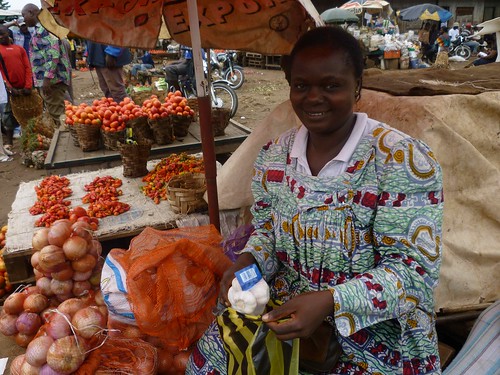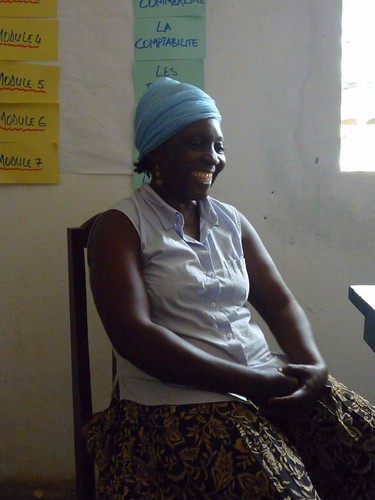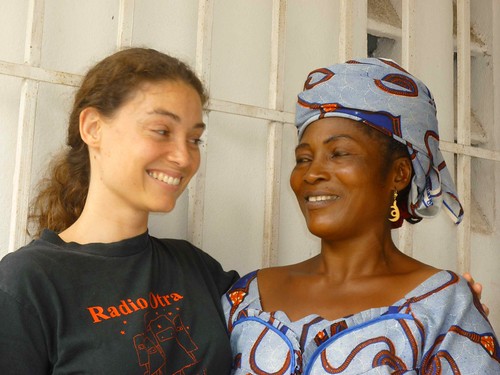Rainy days are coming to Cameroun. C’est la saison des pluies! For many of us in the West, the rainy season means that we might be spending more time at the library or in the comfort of our house, perhaps sipping a hot chocolate or café crème. For the women traders of the Sandaga market it means quite differently. From the beginning of July to the end of September, the woman traders will have to withstand hours at a time soaked by the rain, hoping to sell a few carrots or gonbo in order to make an average of $1 a day. Effectively, the economic activities of the market slow down substantially during those summer months, barely allowing women traders and their families to subsist. To continue, mosquitoes and other vectors of tropical diseases strive during the rainy season rendering women traders more vulnerable to diseases such as the flu and malaria. As such, women traders at the Sandaga market feel the rainy season in their flesh and bone.
In my development economics class we learned how to determine the national poverty line of a developing country, calculate the headcount of its poor people as well as the depth of poverty within the country. We discussed the percentage of people living below the poverty line -27%, 62% or sometimes even 86%- in a casual manner. I and probably the majority of my academic colleagues did not fully grasp what it means to live on 1 dollar a day, the nature and the extent of poverty that the former implies. In my opinion you can only start to understand once you develop a relationship of trust and care with a person who has to feed her three children on $1 a day. A person like Thérèse Leukeng or Lydie “La Douce” Youssa and Mama Frida or Lydie Nwegah.
Thérèse Leukeng
Thérèse emanates goodness; she is the kind of person who upon entering a room illuminates everyone’s soul. In her interviews, she is concise in her interventions and demonstrates an incredible depth of understanding as it relates to the complexity of the issues at stake. When we cross path at the Sandaga market, she greets us with warmth and genuinely inquires about our well-being and our adaptation to her country. Thérèse has always been motivated by the defense and promotion of women’s rights. She explained to us that many a time she wanted to intervene when she endured or witnessed abuses and discrimination towards herself or other women traders. However, she knew that she had to swallow her pride as the retribution for speaking out could have been dreadful. Today this seed within her, a seed for justice and equity, has been nurtured by the AMA Women Project. As Thérèse explains, “through the training provided by the AMA Women project we have become aware; now we are ready to take action.” UCOMAS serves just that purpose! UCOMAS enables women traders like Thérèse to express their concerns and thus feel empowered to challenge the status-quo. Take a second and look into Thérèse’s eyes and you will see a spark. Because of her inner motivation, Thérèse will keep the other women traders together and motivates them to persevere in spite of great obstacles. Thérèse is UCOMAS silent leader.

Lydie “La Douce” Youssa
Lydie “La Douce” is celebrating her 13th year at the Sandaga market. Today she enjoys a faithful clientele who buys her legumes on a daily basis; nonetheless, she has not always had this regular clientele. Thirteen years ago, Lydie still in her early twenties, would head to the Sandaga market before dusk, placing her newly born on her back and hoping to sell a few products. At the beginning of her time in Sandaga, each day was different; one day she would bring home a small profit from her daily sells, other days she would come back home empty handed. “What saved me is that I never stopped trying,” she recalls. Lydie’s nickname “La Douce” (the soft one) fits her like a glove; she is soft spoken and her gaze is gentle. Despite her soft composure, La Douce is not afraid to speak out her mind. In fact just yesterday Lydie “La Douce” was remembering how she had to confront a “man with a beard” who told her that he had not given permission for the creation of UCOMAS and that a women’s association was worthless. She reminded him that anyone is free to form and partake in an association under constitutional law without seeking any sort of approval from a third party. How is that for advocating for one’s human rights?
Mama Frida
Mama Frida taught me how to say “I approve” or “I like” by simultaneously pressing and pointing my lips in her direction. Every time I see her, that is the first thing we exchange; a talisman of our connection, friendship and love. Her beauty is striking; Eric explained to us that she is a descendant of a royal family in the Western part of Cameroon. Mama Frida is responsible for 11 children and she hopes that through UCOMAS she will be able to improve her condition as well as her family’s. A couple of weeks ago, Mama Frida came with a black plastic bag containing four delicious papayas. I was taken aback by her gift being conscious that this represented an incredible financial sacrifice for her and her family. Seeing our reaction of surprise and polite refusal she became tensed and a bit saddened. Eric told us that that she sees us as her daughters and that we should never refuse a gift from our mother. Despite the omnipresence of poverty in her life, Mama Frida feels compelled to take care of us and to ensure that we eat well. To thank her we wrote a little note saying: “Dear Mama Frida, Thank you for the papayas. We love you.” Eric smiled and told us that Mama Frida will keep this note for the rest of her life.
Lydie Nwegah
Lydie is a tall and elegant Cameroonian woman, her African dresses are colorful and stylish, her fingers are long and always adorned by a vibrant rouge polish. When Lydie Nwegah discusses the problems of the Sandaga market she thinks about her children’s future. As Lydie describes herself: “Je n’ai que des filles et je ne veux pas qu’elles passent par la même chose que moi” (Daughters are all I have and I don’t want them to go through the same things as me). Lydie is a very involved mom and as any mom around the world, she must take time off from her economic activities at Sandaga market in order to care for her daughters when they have the flu for example. Women traders like Lydie must constantly juggle between their duties as mothers and their responsibility as bread winners. Nonetheless, Lydie’s foremost motivation is to create change now so that the next generation of women traders will be able to conduct their activities in a just and dignified manner.

Moving forward…already?
The end of our sojourn in Douala is coming faster than I wish…. we now have less than two weeks before we head to Bamenda and start the second half of our Vital Voices assignment working for Nkumu Fed Fed. There, we will focus on HIV/AIDS and child trafficking. So what have we accomplished thus far for UCOMAS: we put together a brochure presenting some of the basic aspects of the women’s association; we created a google site describing the organization current and planned activities (here is the link, please do not hesitate to send us your feedback: http://sites.google.com/site/ucomas); we will conduct a basic ICT training to familiarize UCOMAS members with gmail, flickr and most importantly enable them to update the google site; finally, we are putting together a short documentary including the women traders’ expertise ranging from general problems at the Sandaga market to the creation of UCOMAS and recommendations for the overall improvement of women traders’ conditions. My feelings are very mixed about leaving UCOMAS at this point in time: upon our departure we will be able to present the women’s association with deliverables but the work feels incomplete… Indeed UCOMAS is a baby as Eric would put it; I want to be here to see it walk a little bit further, stumble and pick itself up on its way to fulfill her dreams.
Posted By Johanna Paillet
Posted Jul 1st, 2009




4 Comments
peya robinson
July 1, 2009
keep the stories coming.
we need to have a close look and understanding of the women and their stories.
I hope organizations with money and staff will be influenced with your and helahs reports and videos. And mainly, take action.
peya
Melysa
July 6, 2009
I feel closer to the women though your writing, which is thoughtful, detailed, and compassionate. You represent their strength and their vulnerabilities with clarity, and it offers the reader an invaluable insight into these women’s lives. Their potential is limitless if they can be offered a platform to exercise their autonomy and entrepreneurial spirit. I admire them as I admire you!
Marilyn NGUEMO
July 24, 2009
Indeed, women in Sandaga are so BEAUTIFUL,
I am marveled by their smiles, generosity, sense of purpose, resilience, and HOPE in a future for themselves and their children that are committed to bring forward.
Thanks for profiling the characters behind the next power conquest initiated, organized and implemented by women for women and men in urban markets in Cameroon.
Emmanuel Ngang
January 20, 2011
Hi Johanna Pillet
After some years after your visit to Cameroon and Nkum mu Fed Fed, I feel that your foot notes and write ups reflects the situation on the ground and the challenges Organisations like Fed Fed face.
You have given a good account about your visit.I we worked through these months in the North West Region of Cameroon.
Emmanuel Ngang